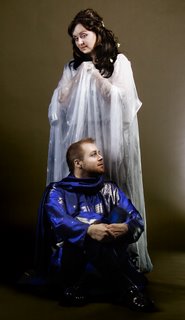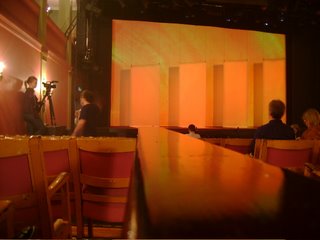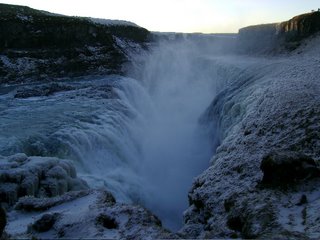



 So, *somewhat* on impulse, but with enough lead time to get my opera tickets in order, I skipped out on the turkey this weekend and instead gave thanks Wellsung-stlye in Iceland.
So, *somewhat* on impulse, but with enough lead time to get my opera tickets in order, I skipped out on the turkey this weekend and instead gave thanks Wellsung-stlye in Iceland.And what a weekend...from half a dozen different kinds of herring to volcanic craters to cocktails and hot dogs with a particularly hospitable contingent of Reykjavik's classical music community, it was a weekend worth blogging.
After initial explorations of the city on Thursday afternoon, and a platter of lamb unlike anything I believed possible, I trekked over to Háskólabíó, a cinema connected with the university campus in Reykjavik. Until the Sinfóníuhljómsveit Íslands moves into their new space in the soon-to-be-revamped Reykjavik harbor in 2009, they are housed in an unglamorous but perfectly adequate hall within the cinema complex.
(The program was Wagner: the Prelude and Liebestod from Tristan und Isolde and, working surprisingly well as a concert piece, the entire 3rd act of Parsifal, featuring the formidable Gurnemanz of Icelandic bass Kristinn Sigmundsson. Spoiled as we all were by Rene Pape's spectacular G-Manz last season at the Met, I went in fully braced to be underwhelmed. I was in for a seriously pleasant surprise: At least in this intimate space, Sigmundsson's performance resonated every bit as richly as Pape's, and was infused with emotion and elegance.
The rest of the singers fared decently well: Ruth-Maria Nicolay had an intense (bordering on terrifying) presence, but a smallish voice. Consequently, she was often drowned out during the Liebestod, but was admirably committed to Kundry's wails and screams during the Parsifal. In her defense, from what I could glean from the website, she was a replacement for Petra Lang, who became unavailable(?) (spake I any Icelandic, I'd know for sure. Perhaps one of our new pals from the symphony can fill us in).
Kolbeini Ketilssyni and Wolfgang Schöne turned in respectable if not thrilling performances as Parsifal and Amfortas, respectively. I couldn't tell if Schöne was legitimately cracking up top, or if he was just doing some Hampson-style emoting. Nonetheless, I found it peculiar. Kolbeini is a light voice for this rep--it worked nicely in that space, but would be lost on a larger house.
The star of the evening was the spectacular Iceland Symphony Orchestra. They should give a master class to the NY Philharmonic. They played with the precision and commitment of a fine chamber ensemble; it was some of the tightest work from an orchestra of that size I have ever heard. Speaking to some of the players in the ensemble, they deflect a lot of the credit to the guest conductor that evening, Johannes Fritzsch. And from what I could tell, this music is deeply felt by Mr. Fritzsch, and manifests itself physically in his conducting subtly and effectively.
See some of Alex Ross' thoughts on this orchestra here.
So that was Thursday evening.
Friday was full of waterfalls, national parks, volcanic craters, northern lights hunting, and geysers (did you know that the word "geyser" in English actually comes from the Icelandic "Geysir", which was the name given to the first of this sort of geothermal activity discovered on the island?)
Saturday brought some museum-hopping, and more lamb. After a quick visit to the illuminated manuscripts of the Icelandic Sagas, and a quick change of shoes and light dinner I headed over to the Íslenska óperan, Reykjavik's very intimate (450 seats) opera house in the center of town.
The performance this evening was the premiere of a new Icelandic opera from composer Karólína Eiríksdóttir entitled Skuggaleiker (English title: Shadow Play). Based on the Hans Christian Andersen story The Shadow, the opera has four characters: A Poet (tenor), His Muse (Soprano) and their Shadows (a counter-tenor and mezzo, respectively). I would have trouble summarizing the basic action of the opera, so here is the english language synopsis on the company's website.
I don't really have the vocabulary to discuss Karólína Eiríksdóttir's complex score. It is music of a contemporary nature to which my ear has never fully adjusted, but there are some beautiful and unexpectedly lyrical lines for the Muse, and some heartbreaking passages for the Poet--Karólína places them late enough in the piece that the uninitiated listener has enough time to adjust to the challenging musical language to be able to appreciate these refreshing moments of lyricism.
The production is very simple (see a picture of the set to the right)--a set of rectangular white panels with slowly shifting lighting cues and a series of related projections.
The four singers: tenor Eyjólfur "Eyvi" Eyjólfsson, soprano Ingibjörg Guðjónsdóttir, mezzo Ásgerður Júníusdóttir, and countertenor Sverrir Guðjónsson display some serious musicianship in their ability to learn and deliver this incredibly challenging score. My biggest compliments to Eyjólfur and Ingibjörg (see picture on the right), two singers from whom I imagine we will be hearing a lot more. Both have effortless voices that, judging by their ability to make it through this piece and deliver some of their finest singing near the end of the evening, are also tireless. Eyjólfur, in particular, sings with the sort of strength and clarity that will make him a true competitor on the international stage.
The setting was intimate and informal enough that I stuck around after the performance to meet some of the cast and creative team, as well as some members of the symphony who were in the audience that night. Fortunately for me, these are some of the friendliest, most inclusive people I have ever had the pleasure of meeting. Several cocktails and a couple of shockingly delicious Icelandic-style hot dogs later, I was able to officially name that evening as the standout of an alotgether incredible weekend.

No comments:
Post a Comment